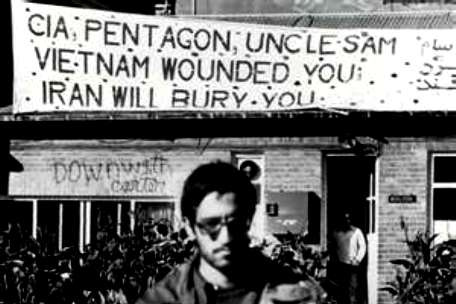Language, Discourse and Foreign Policy

“Whenever I look at the ancient, glorious history of my country certain points attract my attention; for instance, Iranians have been known for their individual independence … in this regard, we are similar to the French … we share the same characteristic with the Americans, and that is why the Iranians and Americans get on good terms with each other.”
- Mohammad Reza Pahlavi, “Mission for My Country”, pages 33-34
“Sports, particularly modern sports, are unquestionably Western. Football is Western, as are basketball, weightlifting, gymnastics, cycling and many branches of track-and-field. Even the Greco-Roman wrestling is Western … in brief, we should do away with the entire modern sports … we will promote our own local sports and with superhuman determination, will export those local sports to the oppressed neighboring countries, and later the [Asian] continent and the rest of the world.”
- “Sports and the Social Circumstances”, Tehran-e Mosavvar Weekly, page 12
In Language, Discourse and Foreign Policy, Majid Adibzadeh draws on the ideas of Michel Foucault (a popular intellectual inside Iran due his supportive comments on the 1979 Islamic Revolution) and critical theories of language to root out the genealogy of the Islamic Republic of Iran's foreign policy discourse -as an element of contemporary Iranian culture’s web of signs and symbols- in order to tease out the latent features of the discourse and its xenophobic features. As the author states himself, the mission of the book is to “upgrade rationality in Iran's foreign policy and to improve Iranians’ interaction with the outside world” through “concentration on symbolic aspects in reproduction of Iran's foreign policy discourse in a specific period.”
Adibzadeh illustrates how after the 1953 coup against the government of Mohammad Mosaddeq, the hegemonic discourse of the Pahlavi Dynasty promoted a cosmopolitan discourse which emphasized Iran's similarity to the industrial Western countries. The discourse was contested by an unofficial rival, one which stressed Iran's difference with the West and tended to redefine the “iron curtain of identity” between us and them. Through the dialectic of two opposing discourses, i.e. “similarities with the West” and “differences with the West”, emerged the Islamic Revolution which formed the synthetic “confrontation with the West” discourse. Inside the intertextual domain created following the 1979 Islamic Revolution, anti-Western and anti-Imperialism turned into the key elements of the pro-confrontation discourse, which was disseminated by both the Marxist and Islamist forces of Iranian politics. The new discourse shaped the IRI’s foreign policy discourse, pregnant with a revolutionary, populist spirit. Psychoanalysis of the xenophobic elements in Iran's foreign policy reveals how Iranians employ certain defense mechanisms such as “de-terrorizing from the Iranian world”, “other-ing the West” and employing the sign “(the Great) Satan” to signify the West/United States. The author elaborates on the import of signs such as ‘denial of the status quo ruling the international relations’, ‘localism’, ‘technological/economic independence’ which are part and parcel of the Islamic Republic of Iran's discourse. The sense of Iran's estrangement from the US/West has caused the “impossibility of conciliatory dialogue” between the two parties, according to the author, giving priority to “instrumental interaction/dialogue” instead.
The seven chapters of the book are titled “Reproduction of a Similarity with the West Discourse in the Pahlavi Dynasty’s Power Discourse”, “Reproduction of a Difference with the West Discourse in the Anti-power Discourse”, “Redefinition of Identity Boundaries vis-à-vis the West in the Symbolic Sphere of the Iranian Society”, “Revolution and Dialectic in the Discursive Sphere of the Iranian Society”, “Reproduction of Confrontation with the West Discourse in Evolution of the Islamic Revolution Discourse’, “Emergence of the IRI’s Foreign Policy Discourse” and “A Psychoanalysis of Xenophobia in IRI’s Foreign Policy Discourse.”
Author: Majid Adibzadeh

